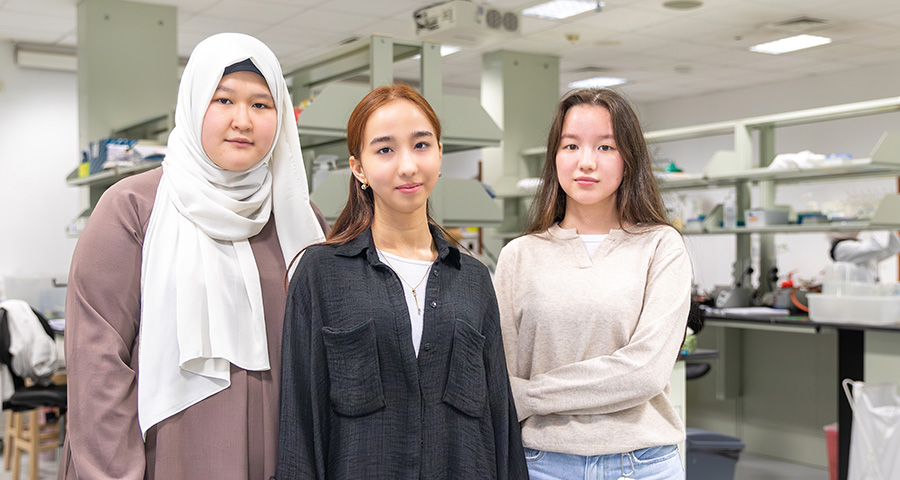
Students hone biological science skills at CMU Pittsburgh
This past summer, three rising sophomore students at CMU-Q, a Qatar Foundation partner university, participated in the Summer Research Institute at CMU’s Mellon College of Science. The program takes place over 9 weeks, with students working in the laboratory on research projects in molecular biology and biochemistry. Madina Kunakbaeva, Zhansaya Matkenova, and Jemal Velihanova joined students from the Pittsburgh campus for the experience.
Originally published by Mellon College of Science News, August 21, 2023.
Program brings Carnegie Mellon undergraduates from Doha and Pittsburgh together to conduct research
By Kirsten Heuring
During the academic year, Carnegie Mellon University in Qatar rising sophomore Madina Kunakbaeva’s family is three hours ahead. This summer, the time difference has been 10 hours.
“For the first time in my life, I have to wake up before 11 a.m. during weekends in order to have a call with my family and sometimes I stay until 3 a.m. in order to have a call with my family,” said Kunakbaeva, a native of Kazakhstan.
Kunakbaeva was one of eight Carnegie Mellon Qatar students to travel from Doha, Qatar, to the Pittsburgh campus for the Department of Biological Sciences’ Summer Research Institute (SRI), an immersive experience for undergraduates who have completed their first year and are interested in biology. This is the first time the program has run since 2019.
Students from Carnegie Mellon’s Pittsburgh and Qatar campuses are taught basic research techniques for the first two weeks then spend the rest of the summer working with professors from the Department of Biological Sciences. This year, Assistant Professor Drew Bridges, Assistant Professor Zheng Kuang and Professor John Woolford welcomed 16 students to their labs.
“The SRI program is a unique opportunity for both the undergraduates and professors to attempt science that may not otherwise take place and provides students with a crash-course research experience,” Bridges said.
Kunakbaeva worked with the Kuang lab, which studies how molecular mechanisms in the gut microbiota affect mammals’ circadian rhythms, which control sleeping patterns. One enzyme the lab focuses on is histone deacetylase 3 (HDAC3), which represses DNA transcription in cells, controls when proteins are produced and regulates protein function. If the Kuang lab figures out the molecular mechanisms of how HDAC3 affects circadian rhythm through the microbiota, these mechanisms could be potential targets for treatment in the future.
Kunakbaeva said that she was fascinated by seeing how cellular mechanisms could connect to health outcomes. SRI helped her see research in a new light.
“I’m currently considering the option to go to grad school and do research because I really enjoyed it,” Kunakbaeva said. “I will continue to explore my interest in research and molecular biology.”
Sarah Kang is a rising junior in the BXA program at Carnegie Mellon in Pittsburgh, where she studies biological sciences and fine arts. Before SRI, she had never experienced lab work. She also was in the Kuang lab.
“This is my first time doing research,” Kang said. “It’s the most challenging thing that I’ve ever done when it comes to bio. But it’s been really cool getting to talk to professors and people in a lab while you’re actually working on the same things they are working on.”
Kang said she enjoyed learning new techniques and developing her independence with research. The experience has helped her consider creating a documentary to showcase what research is really like.
“I’m compelled by the narrative aspect of science,” Kang said. “Before I got into this program, I was really unsure of what research consisted of, what the timeline was or how that process even gets started. I would want to create something that explains that journey.”
Kuang said that he enjoyed helping students with their first research experiences.
“Working with the SRI students reminds me of how I performed my first experiment as a rising junior,” Kuang said. “It is a pleasure to be part of the program and help the students start their research journeys.”
Robert Famiglietti is a rising sophomore in biological sciences at Carnegie Mellon in Pittsburgh. Interested in joining a lab this fall, he thought that SRI would be a good way for him to begin research.
“Having that background knowledge would be very beneficial,” Famiglietti said. “As soon as I saw this program, I jumped on it.”
Famiglietti joined the Bridges lab to investigate the bacteria Vibrio cholerae, which cause cholera. When V. cholerae try to infect a host, the bacteria form into a biofilm-like structure that can protect it from stomach acids as it makes its way to the intestines. The Bridges lab has found a specific chemical that affects biofilm formation for V. cholerae, and researchers are testing other bacteria, including E. coli, to see if the same chemical affects other bacterial biofilms.
Famiglietti said that he is excited about the potential of this research to serve as a treatment for certain bacterial infections. Besides learning valuable research skills, he said he learned more about Carnegie Mellon Qatar.
“Hearing about the CMU-Q students’ experiences over there, it’s actually inspired me. I’m going to check out studying abroad over at CMU-Q,” Famiglietti said. “It’s a really cool thing, and I feel like I made a lot of friends working with them over the summer.”
